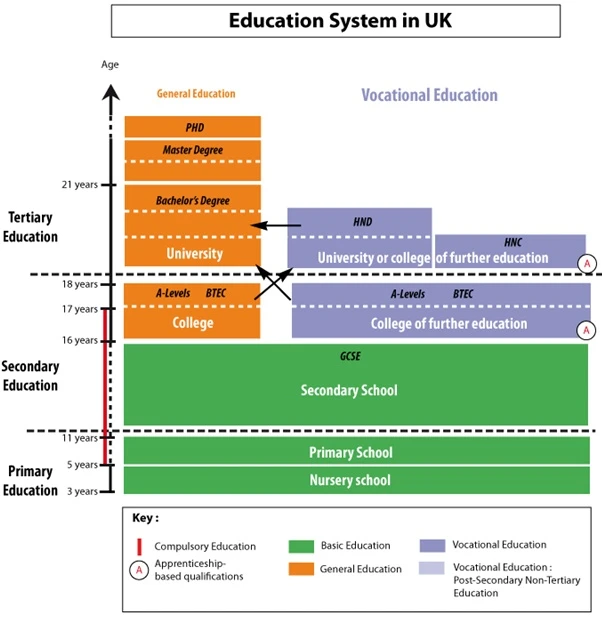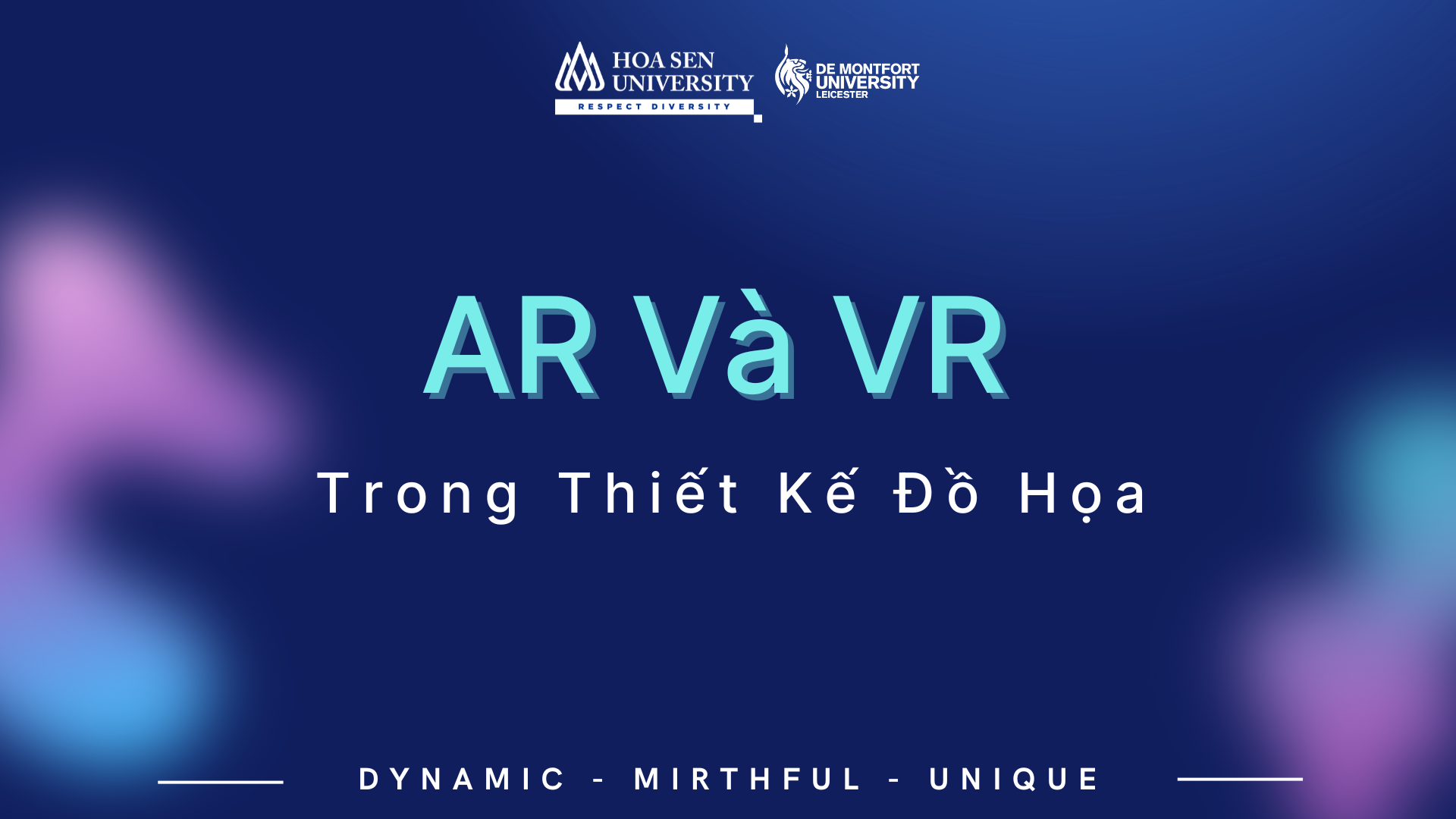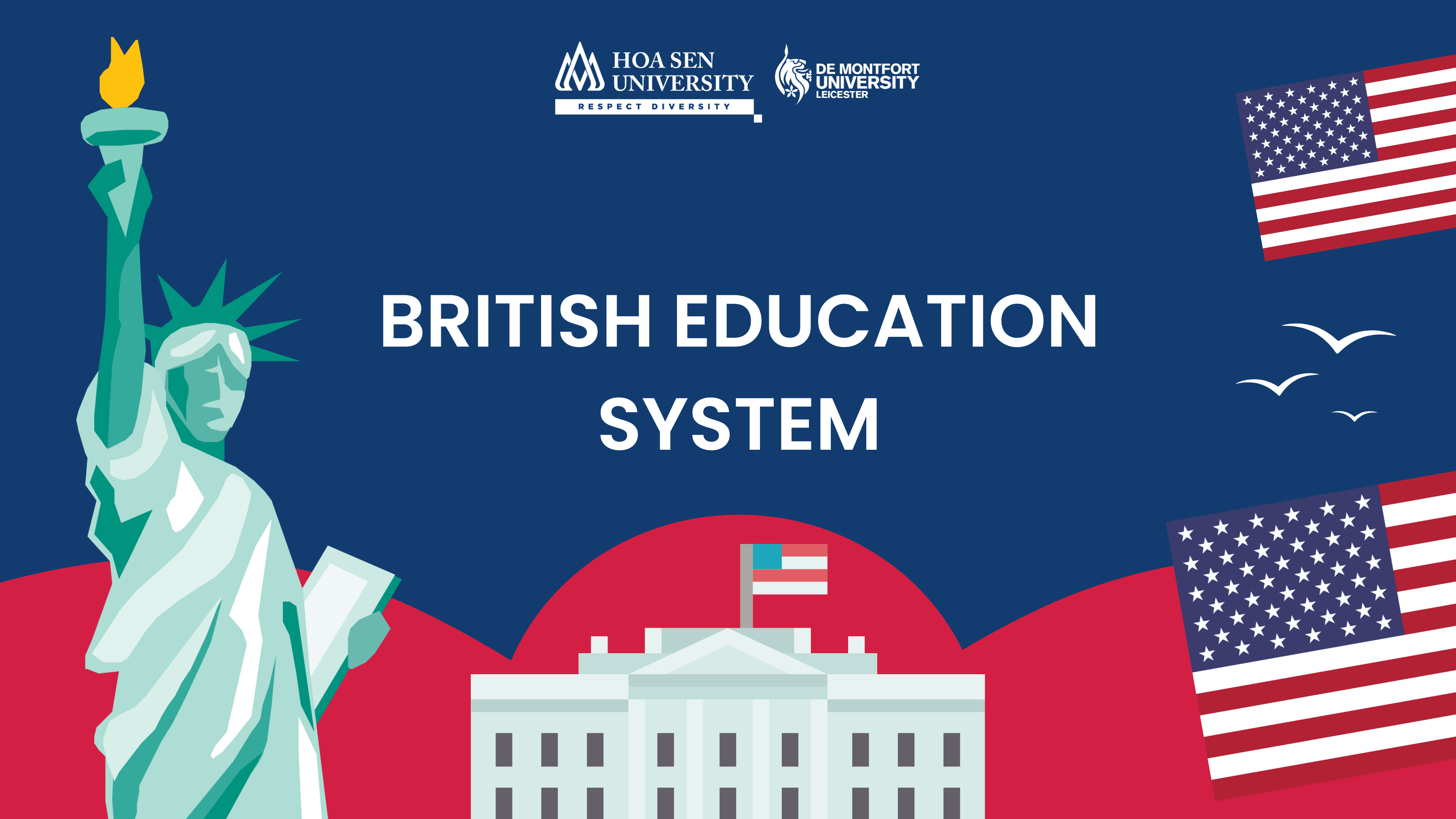What’s Special About the UK Education System?
The UK education system is renowned worldwide for its excellence, thanks to its long-standing universities and a tradition of unique and effective teaching methods. Combining tradition and innovation, this system not only imparts knowledge but also focuses on the comprehensive development of students.

One of the special features of the UK education system is the diversity and flexibility in teaching methods. From public schools to independent schools and academies, students have many options to suit their individual needs and interests. Additionally, the system encourages creativity and personal development through extracurricular and co-curricular activities.
1. Education Stages in the UK
Compulsory education in the UK is divided into four main stages, distinguished by the age of the pupils. The first stage covers children aged 5 to 7, and the fourth and final stage lasts from 14 to 16.

Here are the four stages of compulsory education in the UK and the curriculum for each main stage:
1.1 Stage One: Ages 5-7 (Primary)
The first stage of compulsory education in the UK covers children aged 5 to 7, also known as primary school, which comprises the first two years.
Key subjects in this stage include:
- English
- Mathematics
- History
- Geography
- Physical Education
- Music
In the first year of this stage, students undergo the Phonics test, a short assessment of their ability to decode and understand sounds. Typically, teachers will ask students to repeat a list of around 40 words aloud. At the end of this stage, students take an exam to assess their knowledge development in English, Mathematics, and Science.
1.2 Stage Two: Ages 7-11 (Junior Secondary)
From ages 7 to 11, students are in the second stage of compulsory education, covering Years 3 to 6. The curriculum at this level aims to deepen students’ understanding of core subjects.
At the end of this stage, students are tested in:
- English Reading
- English Grammar, Punctuation, and Spelling
- Mathematics
- Science
English and Mathematics tests are conducted through national assessments, while Science progress is assessed independently by teachers.
1.3 Key Stage Three: Ages 11-14 (Senior Secondary)
Students aged 11 to 14 are in the third stage, covering Years 7 to 9. This stage is crucial as students prepare for the national GCSE exams.
Subjects studied in Key Stage 3 include:
- English
- Mathematics
- Science
- History
- Geography
- Art and Design
- Music
- Physical Education
- Modern Foreign Languages
- Design and Technology
- Computing
At the end of Key Stage 3, some students may sit for GCSEs or other national qualifications.
1.4 Key Stage Four: Ages 14-16 (Further Education)
The final stage of compulsory education, Key Stage Four, lasts from ages 14 to 16 and covers Years 10 to 12. This period is most common for pupils to take national assessments leading to GCSEs or other national qualifications.
The core subjects at this stage include:
- Computing
- Physical Education
- Citizenship
Additionally, schools in the UK are required to offer one of the following subjects:
- Art
- Design and Technology
- Humanities
- Modern Foreign Languages
1.5 Stage Five: Higher Education System
UK higher education is highly regarded globally for its standards and quality. The reputation of UK higher education is reflected in the success of its graduates, many of whom are prominent in various fields worldwide.
Many UK universities are ranked among the top in the world. London, in particular, is considered a global hub of higher education, with four universities ranked in the world’s top ten.
Higher education in the UK follows secondary school, where students must sit a standardized examination to qualify for higher education.
2. Education Program for International Students
International students must follow several important steps to study in the UK, including choosing a suitable school, preparing documents, proving finances, and applying for a visa.
Vietnamese students can apply to study Year 10 in the UK after completing grade 9, participating in the GCSE program for three years. They may be considered native students and might not need to take an English test, though it’s advisable to check with the school or a study abroad agency.
Students who have completed three years of high school need important certificates, degrees, and transcripts to enter a UK university.
Many UK universities have partnered with Vietnamese institutions, such as Hoa Sen University’s collaboration with De Montfort University in Leicester, UK. This program allows students to study locally while earning a globally recognized degree, saving up to 20% of the cost compared to studying in the UK.
3. Job Opportunities
Studying for just three years allows students to start internships early, accumulating up to a year of work experience. Additionally, students have opportunities for internships at large Vietnamese companies or even multinational corporations, which are partners of Hoa Sen University.
4. Comparing the UK and Vietnamese Education Systems
| Criteria | British Education System | Vietnamese Education System |
| Levels | 4 main levels: Preschool, Primary, Secondary, College | 5 main levels: Preschool, Primary, Secondary, High School, University |
| Teaching Methods | Student-centered, focusing on critical thinking and problem-solving skills | Traditional, focusing on rote learning and guided practice |
| Assessment | Combines exams, subjects, and assesses actual abilities | Mainly based on exams that determine the student’s future |
| Private Education | More common, many schools are self-funded | Less common, mostly state-supported |
5. Conclusion
The UK education system is an ideal springboard for students, offering great potential and opportunities. By committing to quality and encouraging creativity, it equips students with the skills and knowledge needed for future success. It also prepares students with the knowledge and spirit to explore new opportunities.
CTA: If you are interested in “studying abroad on-site,” follow our page for useful information about the Hoa Sen – De Montfort International Joint Program! To receive more information about the program, please register here.
See more:
- Bachelor of Graphic Design at Hoa Sen – De Montfort Program
- Teaching Staff at Hoa Sen – De Montfort Program
- Graphic Design: Creative Art More Than Software
——————————-
CONSULTATION CONTACT: Hoa Sen – De Montfort Program (Institute of International Education)
Register for consultation here
? Address: Room 1007, 10th floor, 08 Nguyen Van Trang, Ben Thanh Ward, District 1, Ho Chi Minh City
☎️ Phone: 028 7309 1991 (Ext: 4792)
? Hotline: 0888 275 276
? Email: demontfort@hoasen.edu.vn
? Website: www.hoasen.edu.vn/demontfort/















